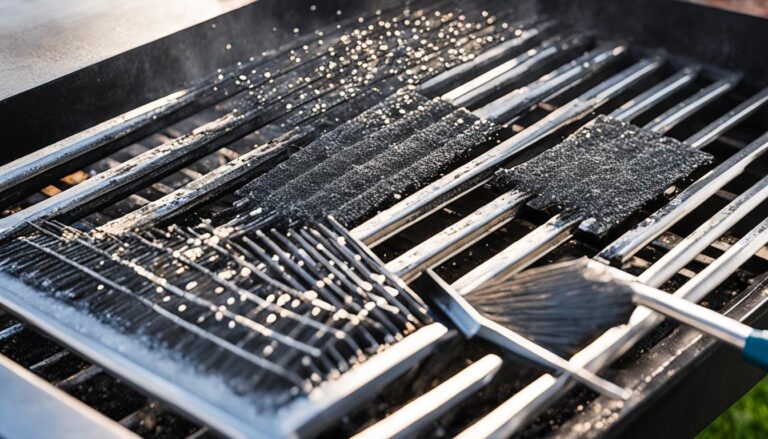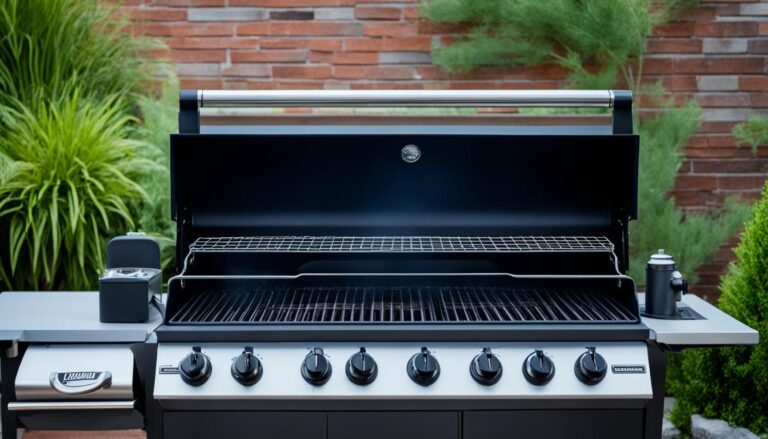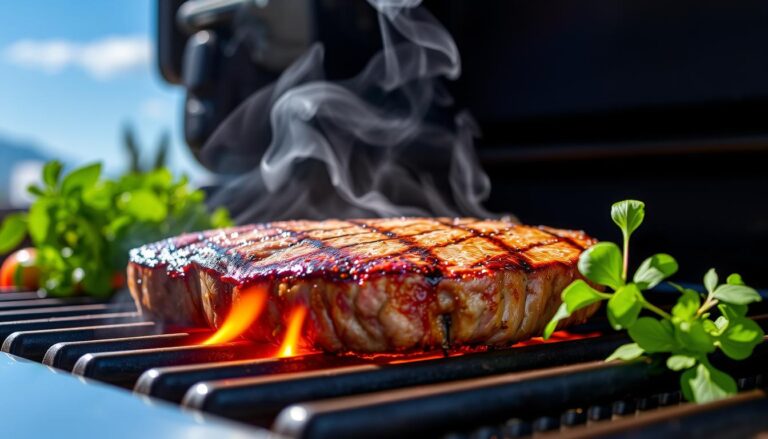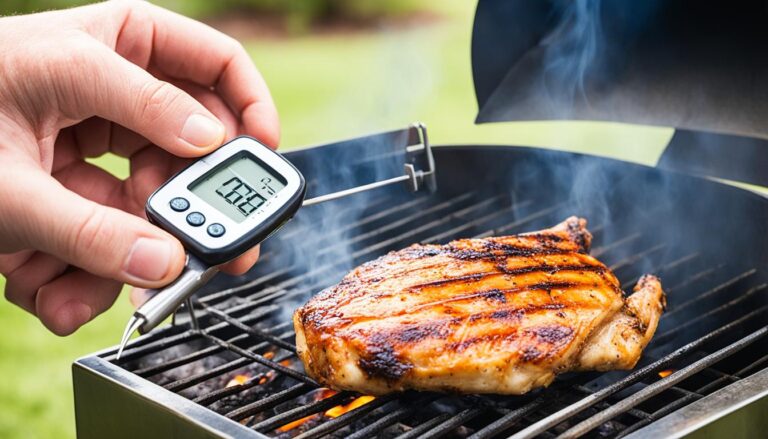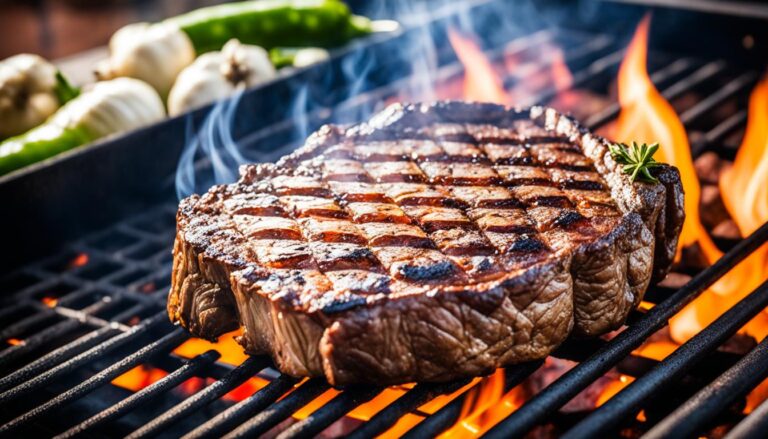
The sizzle of a juicy steak, the aroma of grilled vegetables in the air – nothing beats a backyard barbecue. But, the crusty build-up on the grates can spoil your meal. Learning How To Clean Gas Grill Grates is key for every griller. Let’s explore grill maintenance and barbecue cleaning to make your next cookout a hit.
Cleaning your gas grill grates might seem hard, but it’s vital for great food and a lasting grill. Grilling often means you should deep clean every 4-6 months. But, if you grill less, you might only need a deep clean once a year. Still, regular upkeep after each use is crucial for a well-maintained grill.
Grill grates come in different materials like cast iron, porcelain, and stainless steel. Porcelain grates need gentle cleaners, while stainless steel can take a tougher scrub. Regardless of your grates, ignoring them leads to rust and affects your food’s quality and taste.
Key Takeaways
- Regular cleaning prevents rust and maintains food quality
- Deep clean frequency depends on grill usage
- Different grate materials require specific cleaning methods
- Avoid wire brushes for safety reasons
- Never put grill grates in the dishwasher
- Use gentle cleaners for porcelain-coated grates
- Soaking grates can help loosen stubborn residue
The Importance of Clean Grill Grates
Clean grill grates are key to keeping your grill in top shape and making grilling safe and fun. Cleaning them often boosts the taste of your food and helps your grill last longer.
Health and Safety Benefits
It’s vital to keep your grill grates clean for your health and safety. Cleaning them stops harmful bacteria from building up and lowers the chance of getting sick from food. For gas grills, clean grates reduce the risk of flare-ups from grease and food bits. Experts say to clean your grill grates after each use to stay safe.
Improved Taste and Cooking Performance
Clean grates make your grilled food taste better. They stop old flavors from getting on your food and help heat spread evenly. A grill grate cleaner after each use removes food bits that can change the taste. For tough stains, a baking soda paste can clean them off without harsh chemicals.
Extended Grill Lifespan
Regular cleaning keeps your grill from rusting and corroding. For stainless steel grates, use a wire brush. Nylon bristles are best for porcelain or ceramic grates, and a Palmyra brush is great for cast iron. Clean your grates deeply every 4-6 months if you grill a lot, or once a year if you grill less often. This keeps your grill working well for many years.
“A clean grill is a happy grill. Regular maintenance not only improves your food’s taste but also prolongs your grill’s life.”
| Grate Material | Recommended Cleaning Method | Cleaning Frequency |
|---|---|---|
| Stainless Steel | Wire brush, grill cleaner | After each use |
| Cast Iron | Palmyra brush, season after cleaning | After each use |
| Porcelain-Coated | Nylon bristles, gentle cleaners | After each use |
Understanding Different Grill Grate Materials
Grill grates come in various materials, each with unique properties affecting cleaning and maintenance. The three most common types are stainless steel grill grates, cast iron grill grates, and porcelain grill grates. Let’s explore their characteristics to help you choose the best option for your grilling needs.
Stainless steel grill grates are popular for their durability and ease of maintenance. They heat up quickly, resist rust, and clean easily. For casual grillers, stainless steel is an excellent choice due to its low-maintenance nature and long lifespan.
Cast iron grill grates excel in heat retention, creating perfect sear marks on your food. They develop a natural non-stick surface when properly seasoned. While they require more care, cast iron grates can last a lifetime and provide superior cooking results.
Porcelain grill grates offer a balance between the properties of stainless steel and cast iron. They provide good heat retention and are relatively easy to clean. Porcelain-coated grates can be made from steel or cast iron, with the coating adding extra protection against rust and sticking.
| Grate Material | Heat Retention | Maintenance | Durability | Cleaning Ease |
|---|---|---|---|---|
| Stainless Steel | Good | Low | High | Easy |
| Cast Iron | Excellent | High | Very High | Moderate |
| Porcelain | Very Good | Moderate | Moderate | Easy |
When cleaning your grill grates, consider their material. Stainless steel can handle vigorous cleaning, while porcelain-coated grates require gentler treatment to avoid chipping. Cast iron grates need regular seasoning to maintain their non-stick properties and prevent rust.
Essential Tools for Cleaning Gas Grill Grates
Keeping your grill grates clean is key for great meals and a grill that lasts. Let’s look at the top tools you need for this job.
Brushes and Scrapers
A wire brush for grates is perfect for getting rid of tough grime. The Weber 12″ Three-Sided Grill Brush can clean grates in just 2 minutes and 30 seconds. If you prefer a safer choice, the Kona Safe/Clean Grill Brush is a good pick, taking about 3 minutes and 40 seconds to do the job.
Cleaning Solutions
A grill grate cleaner is a must for deep cleaning. A mix of 2 cups of vinegar and 1 cup of baking soda makes a strong, natural cleaner. This solution is great for removing tough grime. For porcelain-coated grates, use a gentle mix of baking soda, water, and soap to prevent damage.
Protective Gear
Remember to protect yourself while cleaning. Always wear gloves when dealing with cleaning solutions or hot grates. Safety glasses can also protect your eyes from flying debris. With the right tools and safety gear, cleaning your grill grates will be easy and safe.
| Cleaning Method | Average Time | Effectiveness Rating |
|---|---|---|
| Wire Brush | 2-4 minutes | 4/5 |
| Vinegar Solution | 40 minutes | 3/5 |
| Steam Cleaning | 2-3 minutes | 4/5 |
Preparing Your Grill for Cleaning

Starting with proper preparation is key to effective grill maintenance. A well-prepared grill makes cleaning easier and more efficient. Begin by turning on your grill to high heat for 15 minutes. This step helps loosen stuck-on food, making it easier to clean.
After the burn-off, let the grates cool a bit. They should be warm, not hot, to touch. Remove the grates if you can for easier cleaning. This is important for a thorough clean and lets you check other parts like heat plates or burner tubes.
Before you start cleaning, gather all the tools you’ll need. Here’s a list of what you should have:
- Grill brush or scraper
- Cleaning solution (commercial or homemade)
- Protective gloves
- Bucket of warm, soapy water
- Clean cloth or paper towels
Make sure you have good ventilation when using cleaning products. If you’re using strong chemicals, consider wearing a mask. Regular cleaning not only helps your grill cook better but also makes it last longer.
| Cleaning Frequency | Percentage of Grill Owners |
|---|---|
| After every use | 40% |
| Deep clean every 4-6 months | 45% |
| Rarely or never clean | 15% |
How to Clean Gas Grill Grates: Step-by-Step Guide
Keeping your gas grill grates clean is key for great meals and a grill that lasts. Let’s explore effective ways to clean burnt food and keep your grill in top shape.
Burn-Off Method
The burn-off method is a simple yet effective way to clean gas grill grates. Heat your grill to high for 15-20 minutes. This process carbonizes food residue, making it easier to remove. Once cooled, use a wire brush to scrape off the loosened debris.
Brushing and Scraping
For regular upkeep, brushing and scraping are top choices. Use a wire grill brush or a nylon scouring pad to remove loose particles. For tough spots, try a grill stone or aluminum foil. Clean your grates after each use to stop buildup.
Deep Cleaning Techniques
Deep cleaning is needed every 4-6 months for those who grill often. Soak grates in hot, soapy water for 15-20 minutes to tackle tough stains. For extra tough grime, use a vinegar and water solution. Mr. Clean Magic Eraser is great for grease splatters.
| Cleaning Method | Frequency | Time Required |
|---|---|---|
| Burn-Off | After each use | 15-20 minutes |
| Brushing/Scraping | After each use | 5-10 minutes |
| Deep Cleaning | Every 4-6 months | 40-60 minutes |
Remember, different grate materials need special care. Stainless steel grates work well with a stainless cup attachment tool, while cast iron grates should be seasoned after cleaning. With these tips, you’ll learn how to clean gas grill grates and enjoy tastier food from a well-kept grill.
Natural Cleaning Solutions for Grill Grates
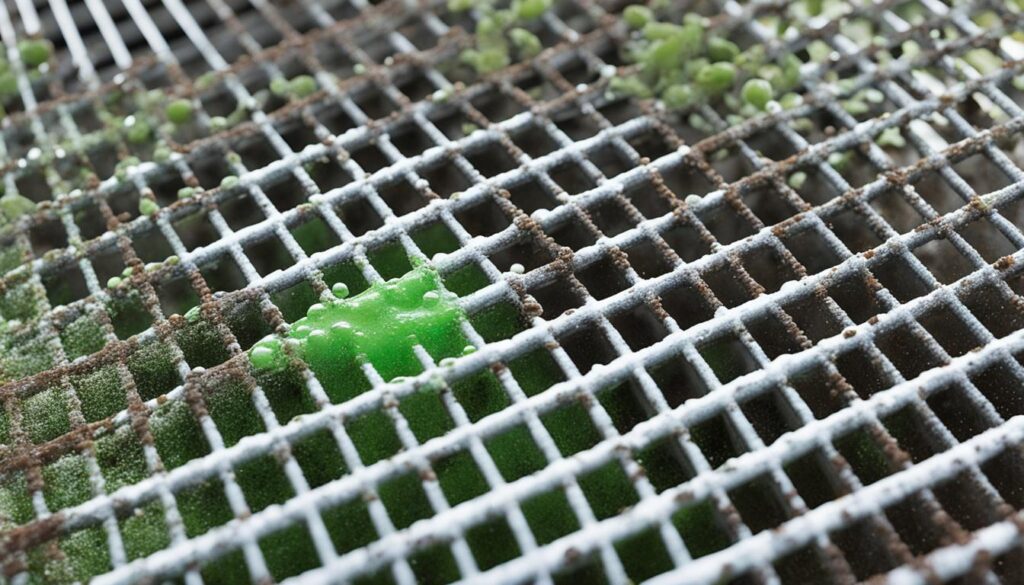
Want to clean your grill grates without harsh chemicals? Try these natural solutions. A vinegar grill cleaner is a great option. Mix equal parts water and white vinegar for an effective degreaser. For stubborn residue, make a paste with baking soda and water.
Here’s a powerful cleaning method:
- Mix 1 ½ cups baking soda with ½ cup water to form a paste
- Apply the paste to your grates
- Let it sit for 10 minutes
- Scrub with a nylon brush
- Rinse thoroughly
For really tough grime, try this baking soda grill cleaner solution:
- Combine 2 cups white vinegar with 1 cup baking soda
- Soak grates overnight
- Rinse and dry completely
These methods work well for most grate materials and don’t leave harmful residues. Regular cleaning after each use prevents buildup and keeps your grill in top shape. Remember to oil your grates after cleaning to prevent rust and make future cleanings easier.
Dealing with Stubborn Grease and Grime
Dealing with tough grease and grime on your grill grates needs special care. Let’s look at ways to remove these residues and get your grates clean again.
Soaking Methods
Soaking your grates can be a game-changer for hard-to-remove grime. Fill a big container with hot, soapy water and soak the grates for a few hours. This softens the tough residues, making them easy to wipe away. For places like restaurants, soaking grates in a vinegar and baking soda mix overnight works best to clear out debris.
Vinegar and Baking Soda Solution
Make a strong cleaner for your grill by mixing vinegar and baking soda equally. Spread this paste on the grates and wait 30 minutes. The mix’s fizzing action breaks down the grease. Then, scrub with a grill brush or an aluminum foil ball to get rid of the grime.
Commercial Degreasers
Commercial degreasers are a strong choice for cleaning off burnt food and hard grease. Follow the instructions on the bottle, making sure to rinse it off before it dries. For any grime left, use a chainmail scrubber for the best clean.
| Cleaning Method | Best For | Time Required |
|---|---|---|
| Soaking in Soapy Water | Light to Moderate Residue | 2-4 hours |
| Vinegar and Baking Soda | Stubborn Grease | 30 minutes – 8 hours |
| Commercial Degreaser | Heavy Buildup | 15-30 minutes |
Cleaning your grill regularly stops grease and grime from building up. If you grill often, deep clean your grates every 4-6 months. This keeps your grill working well and your food tasting great.
Maintaining Clean Grill Grates Between Uses
Keeping your grill clean is essential for tasty and safe meals. After grilling, brush the grates when they’re still warm. This prevents food from sticking and makes cleaning easier later.
Put a thin layer of cooking oil on the grates to prevent rust and make food slide off easily. For gas grills, heat them up for 15 minutes after cooking to burn off residue. This makes cleaning easier next time.
Clean the heat deflectors every four uses to keep cooking temperatures even. Always cover your grill when not in use to protect it from dust, dirt, and bugs.
Regular cleaning cuts down on deep cleaning and makes your grill last longer. Brush grates after every use and do a deep clean every 4-6 months if you grill often. These steps will keep your grill ready for your next outdoor cooking session.

